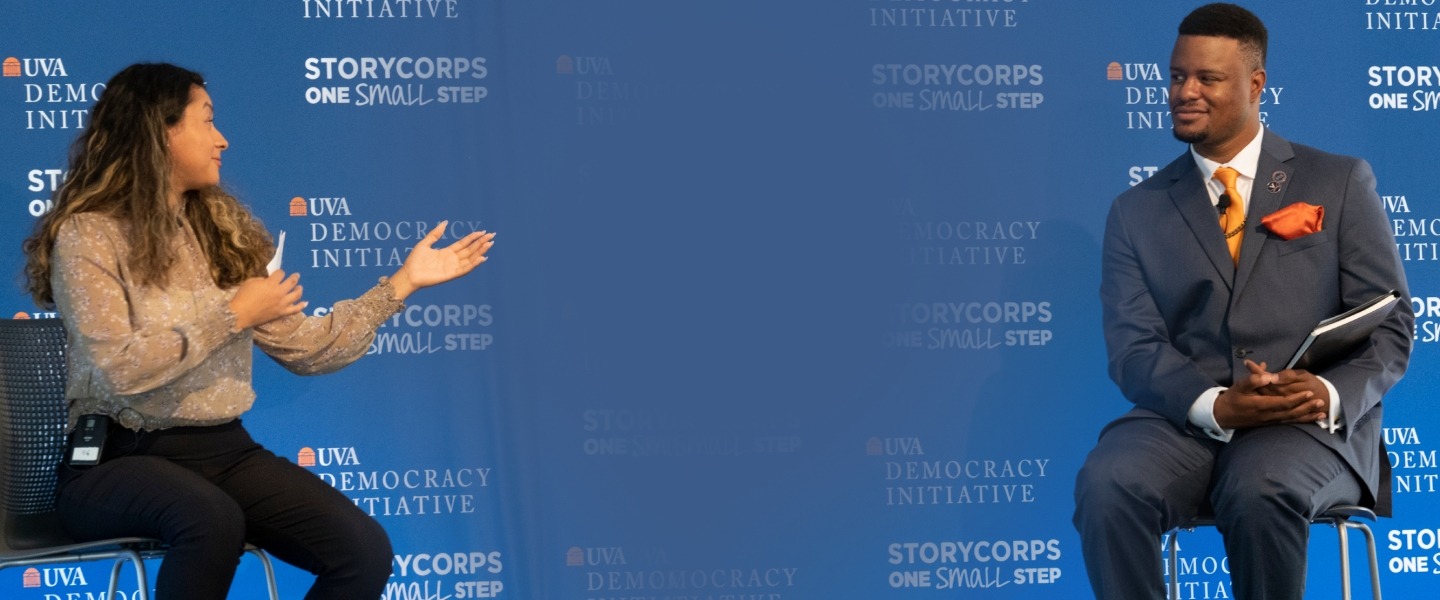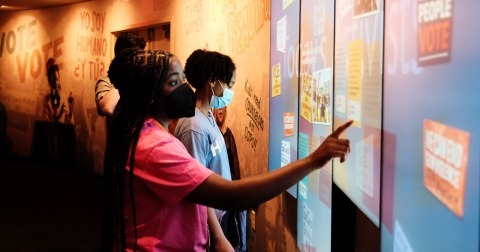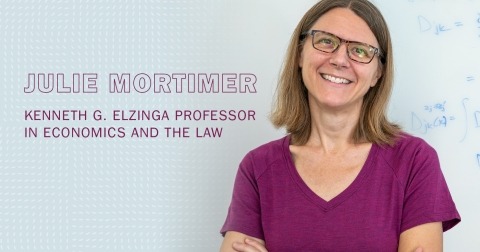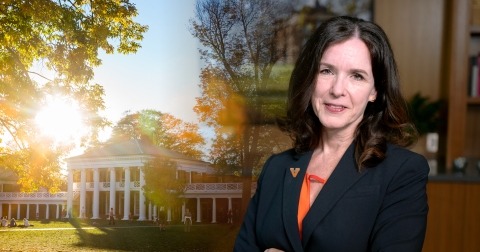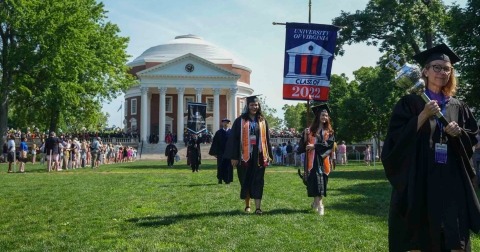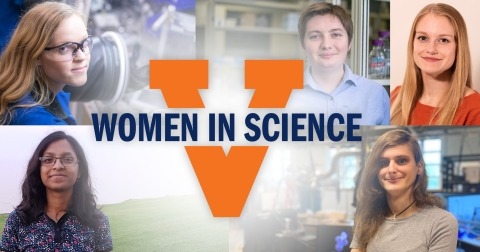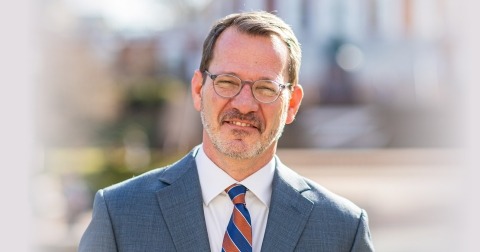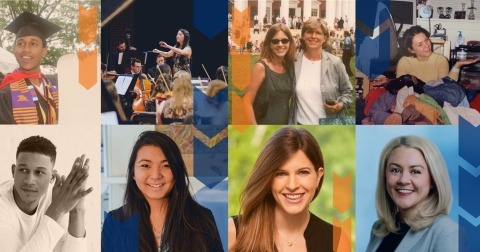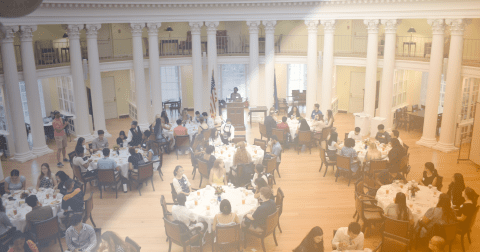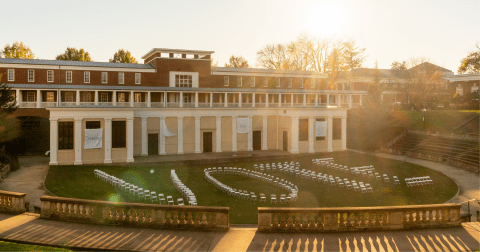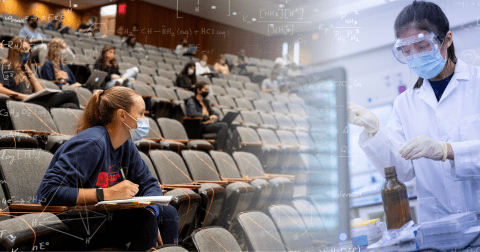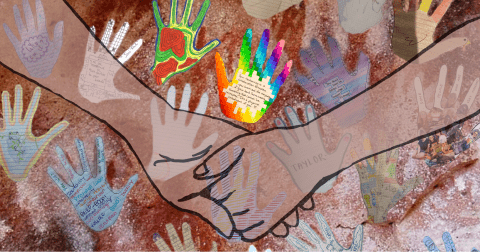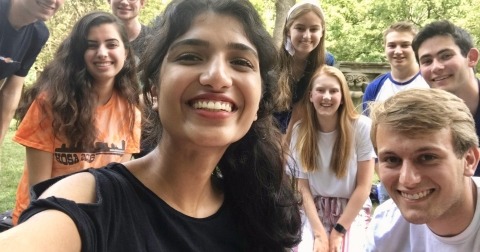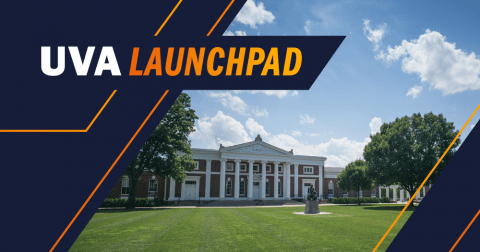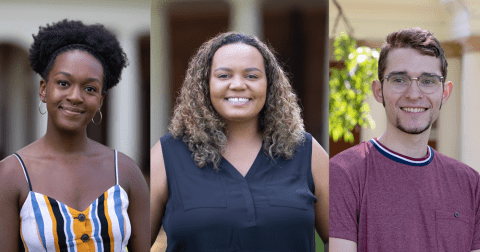StoryCorps first began inviting people to share their stories in a recording booth in New York City’s Grand Central Terminal 18 years ago, and it has since sent Airstream trailers across the country to invite people from all walks of life to recount important experiences in conversations with family members, friends, even former foes who have become valued confidants. About 750,000 people have participated in the celebrated audio project, with some stories aired on National Public Radio and all of them preserved in the Library of Congress and StoryCorps’ searchable archives.
The University of Virginia and StoryCorps introduced their new partnership in the One Small Step project at an Oct. 13 event at Carr’s Hill.
For the next chapter of its mission, StoryCorps aims to document stories that unite rather than divide people and is partnering with the University of Virginia and the College and Graduate School of Arts & Sciences’ Democracy Initiative. In a departure from StoryCorps’ original format, which records conversations and stories shared by people who know each other, One Small Step invites people who may hold opposing views on a variety of topics and who aren’t in each other’s daily lives to get to know each other in conversation.
In October, the Democracy Initiative launched its new partnership with the One Small Step program, making Charlottesville the project’s fifth city and UVA its first major academic partner. (The Dean’s Fund for the Democracy Initiative, supported by donations to the College Foundation, is helping to support the One Small Step partnership.) Moderated by Melody Barnes, executive director of UVA’s Karsh Institute of Democracy and the W.L. Lyons Brown Family Director for Policy and Public Engagement of the Democracy Initiative, the kickoff at Carr’s Hill featured both a discussion between StoryCorps founder and president Dave Isay and UVA President Jim Ryan. The first pair of UVA students to record a conversation for the project also appeared on stage to discuss their experience.
One Small Step began three years ago in four pilot cities – Richmond, Virginia; Wichita, Kansas; Birmingham, Alabama; and Shreveport, Louisiana – as a way to foster meaningful conversations across political divides. The project caught the attention of Barnes and Laurent Dubois, Bicentennial Professor and the Democracy Initiative’s director of academic affairs, as well as the UVA students who encouraged them to pursue a partnership with StoryCorps.

The Democracy Initiative’s director of academic affairs Laurent Dubois (left), and Melody Barnes (right) executive director of UVA’s Karsh Institute of Democracy, discuss the inspiration to partner with StoryCorps.
At a time when political and social environments appear so deeply polarized, One Small Step offers an opportunity to find areas of common ground both on Grounds and with the surrounding community, Barnes said.
“We know that even within the bounds of basic norms, there’s frustration and anger and disappointment. Some wonder how to engage, or even whether to engage,” she said. “But we’ve also heard a strong desire to have these tough conversations, and we believe that they’re necessary alongside all the other work that we do in the Democracy Initiative.”
‘Hate can melt away’
The Democracy Initiative and One Small Step hope to conduct more than 250 conversations with a wide range of participants at the University and from the Charlottesville community. As with StoryCorps’ original project, these conversations are scheduled to be archived in the U.S. Library of Congress.
The political, racial and social tumult of recent years, which has been accompanied by violence in well-documented events in Charlottesville and elsewhere nationally, has led to what StoryCorps founder Dave Isay called this ambitious “moon shot.”
“We’re calling it ‘One Small Step’ because it really is just one small step,” Isay said, explaining how StoryCorps and its projects are rooted in contact theory, which asserts that under very specific conditions, if you put enemies together for a one-on-one experience, and they feel like they have equal footing and they have a visceral experience together, divides can be bridged. “Hate can melt away, and people can see each other in a way that if you do it right, you can see pretty remarkable changes,” Isay said.
He went on to call One Small Step, along with many bridge-building organizations across the country, a “rip in the fabric of our perception of people who are different.”
“And those little rips in the fabric of our perception can make a big difference when push comes to shove,” he said.
’We’re not just our political views’
Aspiring participants are asked to fill out brief bio forms that allow the project’s organizers to pair people who hold different political and social views, but who also may hold some things in common. Olivia Paschal, a first-year history Ph.D. student from Arkansas studying the 20th-century rural American South, was paired with a second-year student of Puerto Rican origins from Northern Virginia for her One Small Step conversation.
Paschal describes her politics as “left leaning” but said while the younger woman she was paired with had a different perspective, they did not dwell on politics. In the hour they spent together recording their conversation at the WTJU radio station, they focused instead on the similarities in their backgrounds and experiences growing up in Christian households.
“I was really impressed with the strong sense of self that she had at her age, and how well-conceived and rooted her beliefs were, even where we differed,” Paschal said. “I just think it's good to have people in our lives who are different and come from different backgrounds. It’s extremely valuable, because if you accept the premise that Americans are siloed by their ethnic backgrounds, class status or whatever, if you can get out of that bubble and sit in a room and have a one-hour conversation with a stranger, I think that’s great, even on a microscale.”
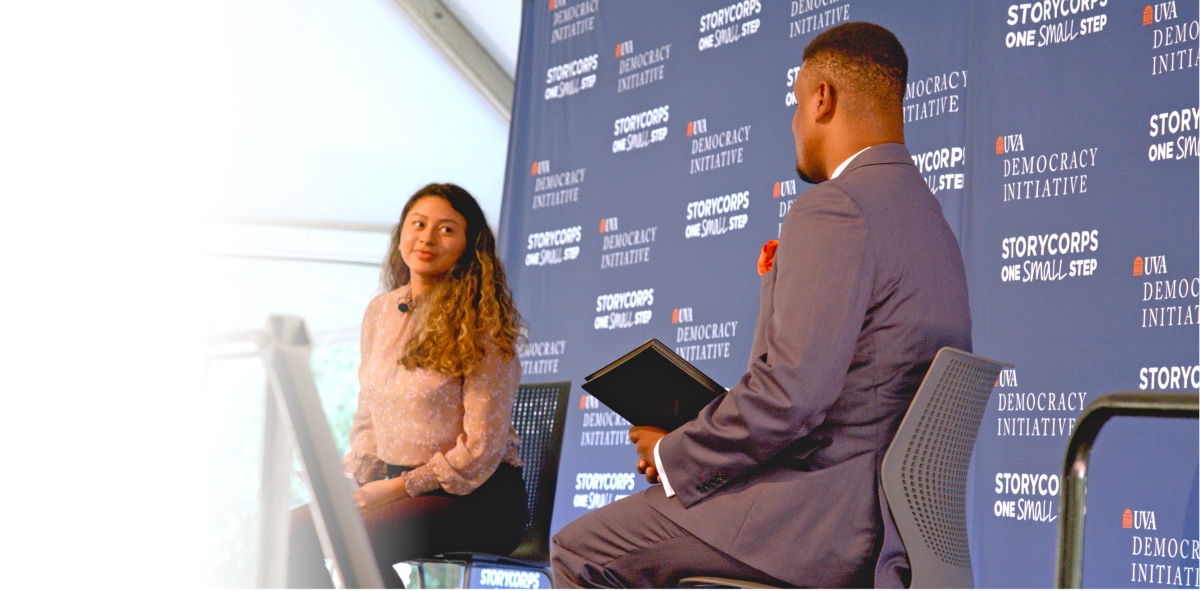
Third-year student Diana Moreno and first-year Marquis Rice discovered they shared the common experience of being first-generation college students at UVA.
For the first two UVA One Small Step participants, third-year student Diana Moreno, daughter of Salvadoran parents who left the Central American country in the 1980s to escape war and poverty and to become U.S. citizens, and first-year Marquis Rice, who served eight years in the Army before coming to Grounds and is chair of the Student Veterans of America at UVA’s veteran service committee, the commonality of both being first-generation students and their relationships with refugee communities helped them navigate a friendly conversation.
“We had different upbringings, so we got into shades of gray in different areas,” said Rice, who considers himself conservative in his political views while appreciating the “mind your own business” lessons his mother imparted on him concerning people’s personal lives.
“My biggest fear at first was that I was going to say something or do something that was going to change the energy in the room,” said Rice, who has been active in fundraising efforts to help Afghan refugees settle in the United States. “But as we talked, I saw how her family was adaptable, and coming from the military, we have to adapt to new environments all the time as well. We really connected over the difference between what was privilege and what was not. Her family came from El Salvador, which was amazing, and they came over here with just the ideas of the American dream: that you can literally make your future, whatever you make it, through hard work and dedication. And her family really shows that.”
Moreno, who grew up in California before her family moved to Virginia six years ago, said she was interested to hear about Rice’s military service, a world she knew little about.
“The first few moments of the conversation were difficult, because I didn’t know what the boundaries were. I didn’t want to disrespect him,” said Moreno, who is studying public policy and media studies. “I also wanted to see what his ideals are, so balancing on that line was hard, but we got it done.”
“Hopefully in the future, we can expand this conversation further, because it’s very nice to get past the social taboos of topics like politics and get to what truly matters,” Rice said.
“We’re not just our political views,” Moreno said in agreement. “We’re so much more than that, and we can find things we agree on. We’re humans at the end of the day.”
Second-year College student Tim Brown, another veteran who served five years in the Navy as a surgical assistant at Walter Reed Hospital, on the USNS Comfort (a Mercy-class hospital ship) and elsewhere, echoed his fellow students in their appraisal of the ease he had finding common ground with his conversation partner, a woman in her mid-30s who runs a diversity and inclusion program.
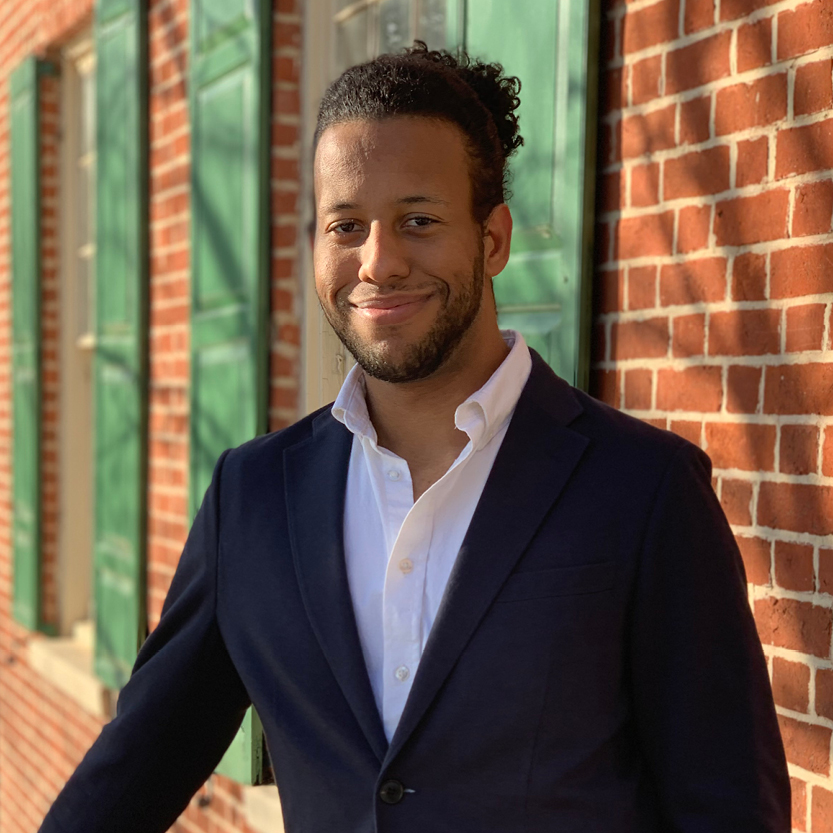
Second-year College student and One Small Step participant Tim Brown served five years in the Navy before enrolling at UVA.
“She spent a little time doing humanitarian aid in Haiti, and I’ve been in Haiti doing humanitarian aid. We also talked about how her father was a veteran, and we spoke about how the military impacts not just service members, but also the people who are around those service members,” Brown said. “We had some interesting conversations about how it can be easy to misjudge or misunderstand where we assume people would be politically just based on what we do for a living. I was really impressed with how much we had in common, which I wasn’t really expecting.”

